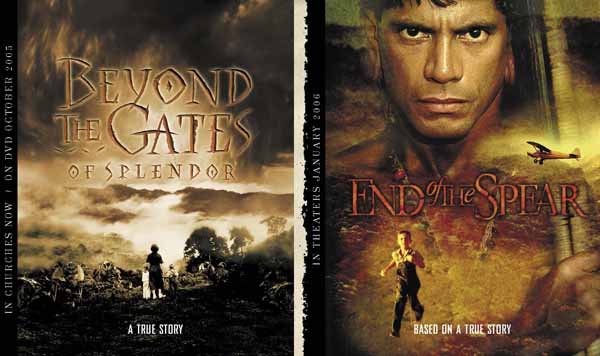 Two things in the End of the Spear movie make it useful for dialog with Muslims about problems we are experiencing from published cartoons of Mohammed.
Two things in the End of the Spear movie make it useful for dialog with Muslims about problems we are experiencing from published cartoons of Mohammed.
First, this movie can have a powerful corrective impact on people who are caught in cycles of vengeance. The Waodani tribe was caught in such a cycle where if you killed (or insulted) one of my relatives, in order to preserve my honor and secure my eternal life, I had to kill (or insult) either you or one of your relatives. And of course, then your family would feel that way about my family, and so the tribe was slowly exterminating itself. They had the same attitude towards outsiders because some of the neighboring oil and plantation workers had offended the Waodani either deliberately or inadvertently. This is exactly what is happening in the Middle East today—especially in Israel. And this is one reason why Iraqis who are dependent upon Americans for security are using roadside bombs on American soldiers. They are getting back at the American “family” for the humiliation and collateral deaths that the Americans have caused. And it is why Muslims are rampaging against the European press for insulting them with cartoons of Mohammed.
The film shows how the cycle of vengeance was halted in the Waodani tribe by the message and example of the missionaries, and it shows the associated price. It took someone to die whose relatives would not retaliate. And it took an explanation of their behavior that was based in “true religion.”
Second, many are complaining that the Christian perspective is not clearly presented in this film. I'd challenge them to find one Hollywood production in which the Christian perspective is presented more clearly. But I digress. This film tells the story from the view point of eight year old Steve Saint and from the view point of the warrior who killed his father. Therefore, this film presents the Christian perspective with the metaphors and language of the Waodani Indians. The Waodani knew nothing of sheep or of Passover sacrifice, so Jesus as the substitutionary lamb would have made no sense to them. They didn't even have written language so that God's word in the Bible would also make no sense to them.
The metaphor through which the Waodani understood verbal special inspiration was God marking a trail by leaving carvings on trees. The metaphor for sacrifice is getting speared. And the metaphor for eternal life is “jumping the great boa.” The metaphor for eternal damnation is “becoming a termite.” The metaphor for “receiving Jesus Christ as your personal savior” is following him on the trail that he has marked.
We all understand the Christian perspective through metaphors. Don Richardson in his book Eternity in their Hearts calls these “redemptive analogies.” Other examples include adoption, receiving, redemption, purchase, and substitution. We understand these concepts in salvation because they come from everyday life in business and legal transactions.
In conclusion, the End of the Spear can have a powerful impact for peace in the Middle East for three reasons. First, because it shows how revenge cycles are characteristic of primitive rather than civilized peoples. Second, because it shows how to interrupt the revenge cycle. And third, because it presents its perspective on true religion in new metaphors toward which Muslims have not built up hostilities.
